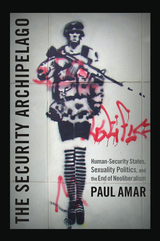2 books by Amar, Paul

Rio as Method
Collective Resistance for a New Generation
Paul Amar, editor
Duke University Press, 2024
Rio as Method provides a new set of lenses for apprehending and transforming the world at critical junctures. Challenging trends that position global South scholars as research informants or objects, this Rio de Janeiro-based network of scholars, activists, attorneys, and political leaders center their Brazilian megacity as a globally-relevant source for transformational worldmaking insights. Presenting this volume as a handbook and manifesto for energizing public engagement and direct action, more than forty contributors reconceive method as a politics of knowledge production that animates new ways of being, seeing and doing politics. They draw on lessons from the city’s intersecting religious, feminist, queer, Black, Indigenous, and urbanist movements to examine issues ranging from state violence, urban marginalization, and moral panic to anticorruption efforts, paramilitary policing, sex work, and mutual aid. Rethinking theoretical and collaborative research methods, Rio as Method models theories of decolonial analysis and concepts of collective resistance that can be taken up by scholar-activists anywhere.
Contributors. Rosiane Rodrigues de Almeida, Tamires Maria Alves, Paul Amar, Marcelo Caetano Andreoli, Beatriz Bissio, Thaddeus Gregory Blanchette, Fernando Brancoli, Thayane Brêtas, Victoria Broadus, Fatima Cecchetto, Leonard Cortana, Marcos Coutinho, Monica Cunha, Luiz Henrique Eloy Amado, Marielle Franco, Cristiane Gomes Julião, Benjamin Lessing, Roberto Kant de Lima, Amanda De Lisio, Bryan McCann, Flávia Medeiros, Ana Paula Mendes de Miranda, Sean T. Mitchell, Rodrigo Monteiro, Vitória Moreira, Jacqueline de Oliveira Muniz, Laura Rebecca Murray, Cesar Pinheiro Teixeira, Osmundo Pinho, Paulo Pinto, María Victoria Pita, João Gabriel Rabello Sodré, Luciane Rocha, Marcos Alexandre dos Santos Albuquerque, Ana Paula da Silva, Denise Ferreira da Silva, Soraya Simões, Indianare Siqueira, José Claudio Souza Alves, Antonio Carlos de Souza Lima, Leonardo Vieira Silva
Contributors. Rosiane Rodrigues de Almeida, Tamires Maria Alves, Paul Amar, Marcelo Caetano Andreoli, Beatriz Bissio, Thaddeus Gregory Blanchette, Fernando Brancoli, Thayane Brêtas, Victoria Broadus, Fatima Cecchetto, Leonard Cortana, Marcos Coutinho, Monica Cunha, Luiz Henrique Eloy Amado, Marielle Franco, Cristiane Gomes Julião, Benjamin Lessing, Roberto Kant de Lima, Amanda De Lisio, Bryan McCann, Flávia Medeiros, Ana Paula Mendes de Miranda, Sean T. Mitchell, Rodrigo Monteiro, Vitória Moreira, Jacqueline de Oliveira Muniz, Laura Rebecca Murray, Cesar Pinheiro Teixeira, Osmundo Pinho, Paulo Pinto, María Victoria Pita, João Gabriel Rabello Sodré, Luciane Rocha, Marcos Alexandre dos Santos Albuquerque, Ana Paula da Silva, Denise Ferreira da Silva, Soraya Simões, Indianare Siqueira, José Claudio Souza Alves, Antonio Carlos de Souza Lima, Leonardo Vieira Silva
[more]

The Security Archipelago
Human-Security States, Sexuality Politics, and the End of Neoliberalism
Paul Amar
Duke University Press, 2013
In The Security Archipelago, Paul Amar provides an alternative historical and theoretical framing of the refashioning of free-market states and the rise of humanitarian security regimes in the Global South by examining the pivotal, trendsetting cases of Brazil and Egypt. Addressing gaps in the study of neoliberalism and biopolitics, Amar describes how coercive security operations and cultural rescue campaigns confronting waves of resistance have appropriated progressive, antimarket discourses around morality, sexuality, and labor. The products of these struggles—including powerful new police practices, religious politics, sexuality identifications, and gender normativities—have traveled across an archipelago, a metaphorical island chain of what the global security industry calls "hot spots." Homing in on Cairo and Rio de Janeiro, Amar reveals the innovative resistances and unexpected alliances that have coalesced in new polities emerging from the Arab Spring and South America's Pink Tide. These have generated a shared modern governance model that he terms the "human-security state."
[more]
READERS
Browse our collection.
PUBLISHERS
See BiblioVault's publisher services.
STUDENT SERVICES
Files for college accessibility offices.
UChicago Accessibility Resources
home | accessibility | search | about | contact us
BiblioVault ® 2001 - 2024
The University of Chicago Press









